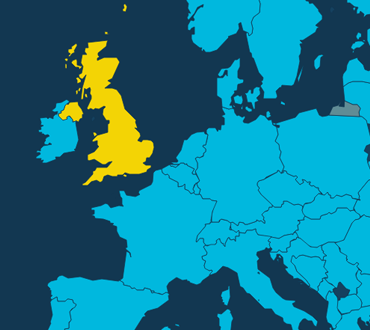 United Kingdom
United Kingdom

ENTRY INTO FORCE of the European Convention on Human Rights
3 September 1953
Number of implemented cases*
428
Examples
Vulnerable victims of domestic violence gain exemption from “bedroom tax”
A woman at severe risk of domestic violence faced eviction from her specially-adapted home because cuts to housing benefits meant she could no longer afford the rent. The European Court of Human Rights ruled that the woman was discriminated against because of her gender. The UK then changed the law to exempt women like her from changes to the benefit rules.
Historic ruling ends ban on gay people serving in the armed forces
Jeanette Smith, Graeme Grady, Duncan Lustig-Prean and John Beckett were all investigated and dismissed from the armed forces because they were gay. The European court ruled that the UK was unable to justify this policy and that its actions against the service members had violated their rights. In response to the judgment, the UK lifted the ban on gay people serving in the military.
Teachers stop hitting children after Scottish mums complain to Strasbourg
Grace Campbell and Jane Cosans sent their children to state schools which continued to allow the use of corporal punishment. The two mothers complained to the European court, which found that this violated their right to have their children educated in line with their own convictions. Soon afterwards, the UK abolished the use of corporal punishment in state schools.
Greater protection for the media after journalist fined for refusing to reveal the identity of his source
Journalist William Goodwin was given leaked information about a company. The company wanted to sue the source of the leak - but William refused to reveal their identity. The UK courts fined him £5,000 for contempt of court. The European court ruled this had violated William's right to receive and give out information.
DNA records of innocent people destroyed after privacy complaint
Two men from Sheffield had DNA samples taken by the police. Criminal charges against them were dropped. However, under British law the police could retain their DNA forever. The Strasbourg court ruled that keeping DNA records of innocent people breached their right to privacy.
Justice for environmental activists in ‘McLibel’ defamation case
McDonald’s brought a successful libel case against two environmental activists, Helen Steel and David Morris, who could not afford a lawyer at the time of the trial. The European court found that the UK’s refusal to grant legal aid to Helen and David caused a breach of their rights. The UK now allows legal aid to be granted, in exceptional circumstances, in defamation cases.
Airline worker wins fight for religious freedom
Nadia Eweida worked for British Airways (BA). She wore a small cross around her neck, as a sign of her religious faith. BA suspended Nadia from work without pay because her cross violated its uniform policy. The European Court of Human Rights ruled that this was an unreasonable interference with Nadia’s right to freedom of religion - leading to a change in relevant standards in the UK.
Man persecuted for his sexuality wins landmark judgment – transforming the law in Northern Ireland and beyond
Since the age of 14, Jeffrey Dudgeon experienced fear and psychological distress because his sexuality was seen as a crime. His house was raided by police, and he was interrogated for hours. In a test case, the European court ruled that the law violated the right to private life. In 1982, Northern Ireland legalised gay relationships – followed by many other European countries.
A mother’s fight for her child’s life leads to better guidance on parental consent to treatment
Doctors thought David Glass was dying – but his mother, Carol, did not think so. The European court ruled that the UK medical authorities should have sought approval from the courts before giving David treatment that Carol had not agreed to. The judgment led the UK to update its guidance on consent to treatment in circumstances when parents object to the proposed treatment of their...
Justice for victims of child abuse
Whilst in their parents’ care, four children were exposed to terrible neglect and emotional abuse. The European court found that the local authority had known about the abuse and had the power to take steps to protect the children, but it had not done so for four-and-a-half years. The children were awarded damages which provided funds for future psychological care.
Safeguards for vulnerable people after autistic man was illegally detained in hospital
H.L., who has autism, was kept in hospital as an “informal patient” after he suffered a mental health crisis. The European court ruled that this amounted to detention and UK law had not sufficiently protected him. In response, the UK introduced legal safeguards for the placement and detention in psychiatric facilities of vulnerable people who cannot make legal decisions for themselves.
CCTV footage of suicide attempt used for publicity
A local authority’s CCTV cameras recorded a man attempting suicide. The local authority released the pictures to the media, after which they appeared in newspapers and on television. The Strasbourg Court ruled that the release of the images had been an unnecessary violation of the man’s privacy.
* This figure includes all judgments and decisions from the European Court of Human Rights (including friendly settlements) concerning which the Council of Europe’s Committee of Ministers has decided that all necessary follow-up measures have been taken. Source: the database of the Department for the Execution of Judgments of the ECHR, HUDOC-EXEC.


